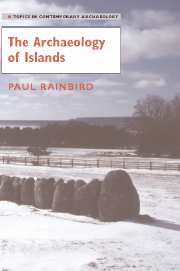Book contents
- Frontmatter
- Contents
- Figures
- Acknowledgments
- 1 A Consciousness of the Earth and Ocean: The Creation of Islands
- 2 Seas of Islands: Anthropology, Biogeography, Archaeology and Postcolonialism
- 3 An Archaeology of the Sea
- 4 The Mediterranean: Malta
- 5 Oceania: Pohnpei and the Eastern Carolines
- 6 The Baltic: Gotland
- 7 Atlantic Archipelago: The Western Seaways of Europe
- 8 Conclusion – Islands and Histories of the Sea
- References
- Index
8 - Conclusion – Islands and Histories of the Sea
Published online by Cambridge University Press: 03 December 2009
- Frontmatter
- Contents
- Figures
- Acknowledgments
- 1 A Consciousness of the Earth and Ocean: The Creation of Islands
- 2 Seas of Islands: Anthropology, Biogeography, Archaeology and Postcolonialism
- 3 An Archaeology of the Sea
- 4 The Mediterranean: Malta
- 5 Oceania: Pohnpei and the Eastern Carolines
- 6 The Baltic: Gotland
- 7 Atlantic Archipelago: The Western Seaways of Europe
- 8 Conclusion – Islands and Histories of the Sea
- References
- Index
Summary
In this book, I have proposed that islands should be a focus of study in regard to their relations with the sea rather than the apparently circumscribed piece of land they represent. In doing this, I have described four case studies which have provided avenues for exploring such an approach. An archaeology of the sea has much to commend it, but there are some loose ends which require clearing up. First, what specifically do I mean when I talk of ‘maritime communities’, what role is there for island archaeology in the future, and finally when the land is viewed from the sea what does an archaeology of the sea provide?
COMMUNITIES IN THE FIELD
In Chapter 3, I argued that there was something distinct about people involved in the sea, something which would allow the application of the label ‘maritime communities’. These communities are the collections of people for whom I have attempted to establish a framework of their histories through a focus on the sea rather than the land. The maritime prehistories have, of course, been mediated through the present, and in particular through a consideration of literature relating to modern and historical populations for whom the sea was a defining factor, whether or not they actually ventured on it regularly, or even at all. These are people that we may say have ‘salt in their blood’ in that the sea defines them. It is easy to forget that in the last century and a half, populations with a marine focus have been by-passed and dispersed through the mechanisation of marine technology.
- Type
- Chapter
- Information
- The Archaeology of Islands , pp. 163 - 174Publisher: Cambridge University PressPrint publication year: 2007



